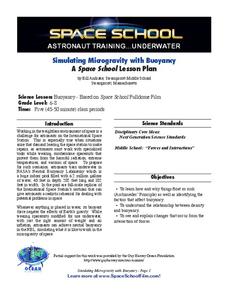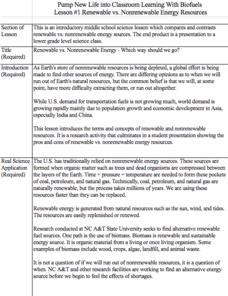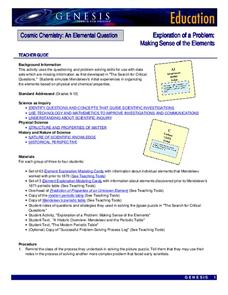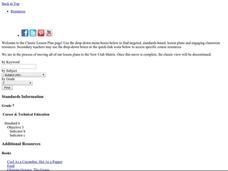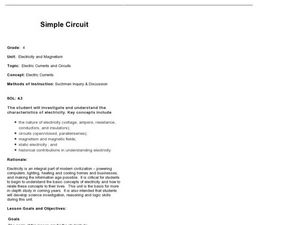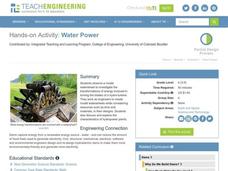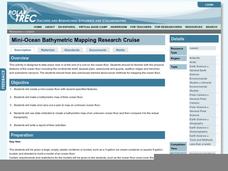Polar Trec
Touring the Poles
Would you want to vacation in the Arctic or Antarctic regions? Scholars research both regions and produce a travel brochure trying to convince tourists to visit. The project focuses on the geography, climate, flora, fauna, and indigenous...
Florida International University
Simulating Microgravity with Buoyancy
How do astronauts know how to live and work in a weightless environment? It doesn't come naturally! Junior physicists conduct experiments to examine the link between buoyancy and microgravity. Each activity illustrates a different aspect...
Towson University
Looking Backwards, Looking Forward
How do scientists know what Earth's climate was like millions of years ago? Young environmental scholars discover how researchers used proxy data to determine the conditions present before written record. Grouped pupils gain experience...
Cornell University
Polymers: Making Silly Putty
Putty is proof that learning can be fun! Share the wonderful world of polymers with your class through an experiment. Young scientists create their own silly putty, then examine its properties.
Science Matters
Energy Flow
Budding scientists work collaboratively to reenact energy flow in a food chain. Scholars take on roles such as producer and consumer and perform tasks that symbolize energy flow in order to provide evidence of how much energy passes...
Howard Hughes Medical Institute
Niche Partitioning Activity
Dinnertime on the African savanna is a highly choreographed event! Introduce young ecologists to the concept of niche partitioning through a hands-on activity. Pupils research animal behaviors and use data to develop an understanding of...
Kenan Fellows
Farm to Fuel: The Alternative Fuels Industry
Need a lesson to fuel young minds? A variety of hands-on activities is sure to get your class fired up! Beginning with an introductory slideshow and culminating with group presentations, the week-long unit has something for everyone....
Kenan Fellows
Renewable vs. Nonrenewable Energy Resources
Is one type of energy inherently good or bad? Young scientists explore energy resources in a week-long unit. After extensive research, groups create powerful position statements and presentations supporting their energy resource of choice.
NASA
Exploration of a Problem: Making Sense of the Elements
When given too much data to simply memorize, it helps to sort it into manageable groups. The second lesson in the six-part series of Cosmic Chemistry challenges groups of pupils to take a large amount of data and figure out how to best...
California Academy of Science
Rapid Brainstorming: How Can We Conserve Our Water Resources?
Water covers around 75 percent of the earth, yet humans struggle to find enough fresh water to live. The fourth of 10 lessons focusing on Fresh Solutions requires brainstorming. Young scientists consider various problems related to fresh...
NOAA
Are You Climate Literate?: Play the Essential Principles Challenge
Installment eight of the 10-part Discover Your Changing World series tests the class's understanding of climate. Scholars play alone or in small groups to assess their understanding of climate systems, causes of climate change, and...
Curated OER
I, Robot, Can Do That!
Assign groups of middle school oceanographers to research one of the following underwater robots; ABE, Herculues, ROPOS, RCV-150, Tiburon, or general purpose ROVs. An included handout guides them through information to be gathered. Each...
Curated OER
Towers of the Lost City
Middle school marine scientists compare the pH change in distilled and saltwater as acetic acid is added one drop at a time. Then they compare the pH change in both when sodium hydroxide is added. This experiment demonstrates the...
Illinois Department of Natural Resources
Section One: What is Biodiversity?
Four intriguing and scientific activities invite learners to explore the natural resources of their town. The activities cover concepts such as genetic traits, organizing species in a taxonomy, the differences between different species...
Curated OER
When A Car Coughs. . .
Budding scientists collect and compare particulate exhaust from four different vehicles. They discuss how cars contribute to air quality. To get the most mileage out of this resource, have learners complete the optional step 5, in which...
Curated OER
Kildare, USA: An Environmental Health Simulation
Your biology class plays the role of epidemiologist when a mysterious illness breaks out in Kildare, USA. Using interviews with doctors, patients, and local citizens, maps, the results from different materials sampling, they work to...
Curated OER
Human Origins: The Prehistoric Human Race
When it comes to the origin of the human species students are full of misconceptions. Clear up the hominid confusion with this evolutionary activity focused on assisting students in understanding prehistoric man and his family tree....
Curated OER
DNA: Expressions in Agriculture
What is DNA extraction, and can you make a living doing it? Yes, if you are in a biotechnology field. Kids learn about DNA extraction, GMOs, and biotechnology careers. They then watch videos and complete activities to understand the use...
Curated OER
The Quicker the Better? Food Processing
Kids explore food choices, nutrition, and agriculture through a variety of sources and activities. They research unknown words on food labels, test the salt content in canned vs non-canned foods, and discuss processed foods. The lesson...
Curated OER
Simple Circuit: Electric Currents and Circuits
Through inquiry and exploration, 4th graders will learn and understand the functions of open and closed circuits. They will break into 2 groups, define vocabulary, hypothesize how to light a bulb, then test their hypothesis 4 different...
Teach Engineering
Water Power
Young hydrologists observe a waterwheel which helps them investigate the transformations of energy that occur when the blades of a hydro-turbine are turning. They work together in pairs and pretend to be engineers who are building a new...
Rivanna Regional Stormwater Education Partnership
Does It Soak Right In?
Which materials are best for groundwater runoff, and which are best for percolation? Discuss the water table with several experiments about different types of soil, pollution, precipitation, and filtration. The experiments assign roles...
Forest Foundation
Fire - How Does it Relate to You?
Forest fires can be a necessary step in keeping a forest healthy, but what happens when they get out of control? Learners investigate the causes and effects of forest fires in two specific areas, culminating in a report about the ways...
Polar Trec
Mini-Ocean Bathymetric Mapping Research Cruise
Middle or high schoolers transform into oceanographers in a week-long simulation. To begin, each group follows directions to create a model of the ocean floor with specified features. Next, the groups prepare to set sail on a research...
Other popular searches
- Earth Science
- Physical Science
- Life Science
- Science Project
- Science Space
- Environment Science
- History of Science
- Environmental Science
- Pe Science
- Family and Consumer Science
- Consumer Science
- Social Science



